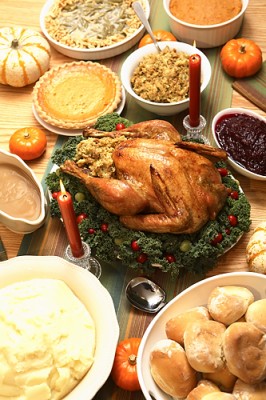Generally considered the start of the winter holiday season, Thanksgiving also represents the start of the holiday eating season.
We may not need a registered dietitian to tell us that it’s easy to overindulge this time of year and we should enjoy food and drink in moderation.
But what an R.D. can tell us is how to make wiser choices when it comes to holiday meals and parties, snacks that show up in the office, and the eating options available to us while we’re on the go during this often busy time of year.

Click on image to hear the broadcast.
“I think before you go [to a party], you kind of have a plan, and decide, ‘OK, I’m going to eat the dinner, and I’m not going to eat a lot of the appetizers, and maybe I’ll have either one drink or a dessert,’” says Linda York, a registered dietitian at UConn Health. “Make a pact with yourself, decide what you’re going to do.”
Drinking alcohol, while it may not increase our hunger, may cause us to be less mindful about what we’re eating.
Another tip is to avoid showing up to a party or dinner on an empty stomach.
“Make sure you have something to eat beforehand so you’re not totally famished,” York says. “Have a big salad. It’s high in fiber, it fills you up… Or have a Greek yogurt, very high in protein and carbohydrates, before you go, and an apple. You’ll still want to eat, but you’re going to eat in a more controlled way.”
Drinking water before a meal also can make us less prone to overeating.
York shared her tips this week on “The Wayne Norman Show” on WILI-AM 1400. She cited research that found most people of normal weight average only a pound of weight gain over the winter holiday season, but they kept that pound.
“You might think that’s not a lot, but in 10 years, that’s 10 pounds,” York says, adding that the same study found people who were overweight or obese did gain more than a pound over the holiday season.
Other holiday weight-gain traps include straying from our exercise routine, substituting fast food for planned out meals, and nibbling on holiday goodies at work.
 The Thanksgiving Feast
The Thanksgiving Feast
At the Thanksgiving table, the turkey may be the least of our worries.
“Turkey’s a great lean protein, there’s really nothing wrong with turkey,” York says. “It’s the gravy we tend to put on the turkey. So just be aware of that. Whenever you add a topical fat – gravy, butter, whatever – think of your thumb tip, or a teaspoon. Try to think, ‘I’m only going to add that much.’ Be aware of those topical fats, remembering that one teaspoon is about 45 calories… You can really get a lot of calories that way.”
Another Thanksgiving staple, stuffing, carries the dual threat of oversized portions and high calories. York recommends limiting starches – that’s both stuffing and potatoes – to a quarter of your plate, with turkey occupying another quarter and vegetables getting the rest of the plate. Modifying the stuffing’s ingredients can also help.
“You can make over any recipe. If you make it lower in fat, it’s going to be lower in calories,” York says. “I make my own homemade stuffing. I might not put sausage in it. I might use chicken broth instead of a lot of butter, which is fat, or margarine, which has the same calories as butter. I might add some nuts or I might add some cranberries to make it interesting. I’d add some celery to it. Put other things, don’t always fill everything with fat.”
When the desserts come out, here again it’s a matter of quantity as well as how they’re made. For those who can’t decide which one to eat, York recommends taking samples to try that collectively are no larger than a single dessert portion.
“After you eat a meal, to me, it’s just having two bites of something sweet,” York says. “And after about two bites, you’re just like, ‘I’ve had enough.’ You don’t have to feel stuffed. That doesn’t have to be the goal.”
Some dessert recipe makeovers include losing the fattening crust and substituting pumpkin pudding or apple and berry crisps for pies, and replacing oil with apple sauce or sweet potatoes when baking.
“I think at Thanksgiving and those special holidays – remember, there’s not many – enjoy it, eat it slowly, and eat the meal, and less of the appetizers.”
Ready to Lose
York runs the six-week “Ready to Lose” weight management program at UConn Health. The next one starts Jan. 12. The introductory session is followed by meetings from 5 to 6 p.m. each Tuesday through Feb. 16. Each session includes a weigh-in, discussion of progress, and a timely nutrition topic such as strategies for eating out, cooking light and right, emotional eating, exercise and activity, and smart shopping. Registration fee is $70, or $50 for past participants. The number to register or to learn more is 800-535-6232.